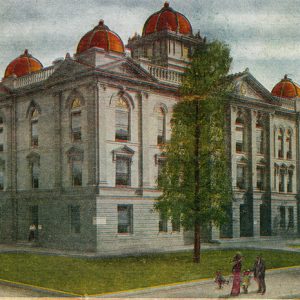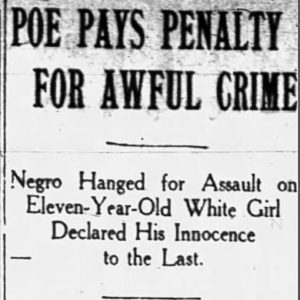calsfoundation@cals.org
Harry Poe (Trial and Execution of)
Harry Poe was the first person legally executed in Garland County, Arkansas. On January 18, 1910, Harry Poe, an African American teenager, allegedly raped Lena Adams, a younger white girl. A Garland County court convicted Poe of rape on March 1, 1910, and sentenced him to death. Several residents of the county believed that Poe was innocent and attempted to save his life. On September 2, 1910, Harry Poe was executed.
The details of Poe’s life before the alleged rape are unclear. Available newspapers variously listed his age as seventeen, eighteen, or nineteen, and provided no details about his life before the incident. Census records do not provide any likely matches for Harry Poe. A writer for the Arkansas Democrat described him in overtly racist language as “a thick-lipped, low-browed, bestial type of negro.”
On January 18, 1910, Lena Adams, a twelve-year-old girl described in the press as “a bright-faced cheery school lass” was returning home from Oaklawn School in Hot Springs (Garland County). According to Adams, Poe ambushed her along a secluded path and sexually assaulted her. Two women who were walking nearby interrupted the attack, and Poe fled. A crowd formed and searched for Poe. His family delivered Poe to the police in hopes that the authorities would protect him from vigilantes.
During the trial, a number of acquaintances of Poe testified that he was at home a mile away when the rape occurred. In addition, Poe did not have counsel to assist him at the “examining trial,” where witnesses were questioned and evidence was produced to determine whether there was probable cause for a person to be arrested and charged. The two women who claimed they came upon the boy and girl did not give testimony at the trial, nor were their written accounts introduced at the trial. However, the Garland County Circuit Court convicted Poe of rape on March 1, 1910, and sentenced him to death.
Tensions arose in Hot Springs over Poe’s potential execution. Poe’s lawyer, R. E. L. Maxey, appealed Poe’s conviction to the Arkansas Supreme Court, raising eighteen separate objections. Most of the objections focused on the idea that Adams mistook Poe for the real culprit and that Poe was denied due process. A party of “a half dozen or more” Hot Springs residents presented Governor George Donaghey with evidence that they believed proved Poe’s innocence, but both the Arkansas Supreme Court and Governor Donaghey rejected all efforts to spare Poe’s life. A group of prominent men from Hot Springs visited R. E. L. Maxey, “warned him not to overstep the bounds of reason,” and made him “understand he would suffer should any harm befall Lena Adams.”
Because Garland County sheriff Jake Houpt “feared that the Negroes of the town might be so wrought up as to cause trouble,” Governor Donaghey sent militiamen “to preserve the peace” in Hot Springs. On September 2, 1910, Harry Poe, who maintained his innocence until the end, was executed. Twenty-five witnesses watched the execution at the Garland County Courthouse, without further incident. Poe’s supporters remained adamant that the state murdered an innocent man.
For additional information:
“Harry Poe Forfeited His Life on Gallows Today for Rape.” Hot Springs Daily News, September 2, 1910.
Motion for New Trial, State of Arkansas v. Harry Poe, Garland County Courthouse, Hot Springs, Arkansas.
“Negro Must Hang.” Arkansas Democrat, March 2, 1910.
“Plead for the Life of Harry Poe.” Arkansas Democrat, June 15, 1910.
Poe v. State, 95 Ark. 172, May 9, 1910, Arkansas Supreme Court.
Thrasher, Christopher, and Guy Lancaster. “Sympathy for Devils: Race, Insanity, and Contention in Garland County’s Two Local Executions.” The Record (2022): 4.1–4.30.
Christopher Thrasher
National Park College
 Civil Rights and Social Change
Civil Rights and Social Change Early Twentieth Century, 1901 through 1940
Early Twentieth Century, 1901 through 1940 Law
Law Garland County Courthouse
Garland County Courthouse  Harry Poe Execution Article
Harry Poe Execution Article 




Comments
No comments on this entry yet.